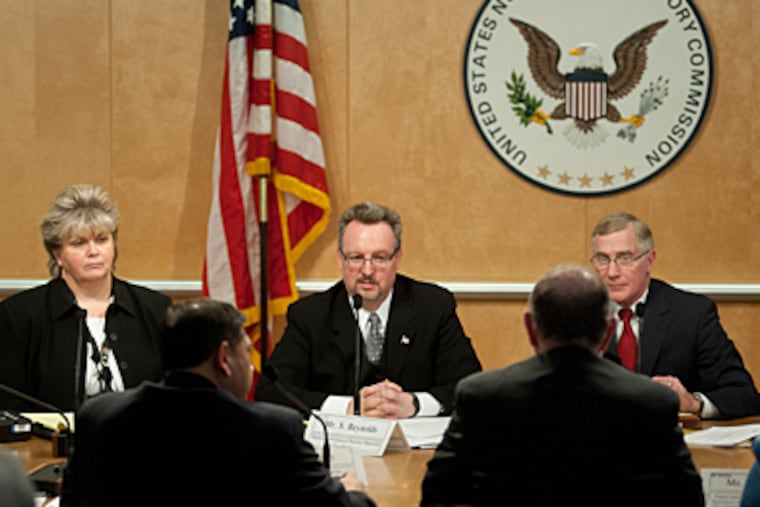NRC finds apparent violations at 13 VA hospitals
The Nuclear Regulatory Commission has found the Department of Veterans Affairs in apparent violation of three federal regulations involving radiation use at 13 VA hospitals across the country, including the Philadelphia VA Medical Center.

The Nuclear Regulatory Commission has found the Department of Veterans Affairs in apparent violation of three federal regulations involving radiation use at 13 VA hospitals across the country, including the Philadelphia VA Medical Center.
While the action could result in a fine, the bigger issue is that the commission could strip the VA of its ability to oversee radiation services at all 153 hospitals nationwide. The commission would then take on those duties or assign them to states such as Pennsylvania and New Jersey that have that capability.
"We have concerns about the way oversight and enforcement actions are being implemented" by the VA, commission spokeswoman Viktoria Mitlyng said.
On Tuesday, the commission, which oversees the medical use of radioactive materials, released the preliminary finding that the VA had violated federal regulations in its 13 prostate brachytherapy programs in hospitals from Brooklyn, N.Y., and Jackson, Miss., to Seattle and Los Angeles.
That list includes Philadelphia, where dozens of men received incorrect doses of radiation for prostate cancer during a six-year period.
But the apparent violations cited by the commission extend beyond Philadelphia to other brachytherapy centers. They involve failing to develop procedures to ensure that care is carefully laid out; failing to verify that the procedure goes according to plan in at least four medical centers; and not reporting one incident of improper dosing within 24 hours, as required.
The commission has scheduled a conference June 30 for the VA to respond to the apparent violations and some additional safety concerns that the nuclear agency raised. After that so-called predecisional enforcement conference, the NRC could issue its findings, levy any fines, or take other actions against the VA.
"We have acknowledged all along that there were missed opportunities in the past," stated VA spokeswoman Katie Roberts. "And we have taken aggressive measures system-wide to ensure our veterans receive safe and effective care."
"While we have not had time to fully review the report . . . VA does look forward to working with the NRC as we move ahead on behalf of our veterans."
In March, the commission levied a $227,500 fine against the VA for a series of failures at its Philadelphia hospital's prostate brachytherapy program that resulted in 97 veterans getting incorrect doses of radiation.
Prostate brachytherapy involves implanting dozens of tiny radioactive seeds into the acorn-sized gland to kill cancerous cells over several months. It is an effective treatment when done correctly.
Records show that the Philadelphia VA's program was deeply flawed from its earliest patients and that doctors and officials repeatedly missed chances to fix it.
Those failures - which occurred from February 2002 until the program was shut down in June 2008 - prompted the NRC to take a deeper look at other brachytherapy programs in the VA system.
The commission also launched an investigation of the VA's national radiation safety committee and its National Health Physics Program, which oversee the use of radiation across the Veterans Health Administration.
The NRC's Mitlyng said it was worrisome that those VA safety organizations failed to identify problems such as underdosing of patients, accidentally implanting radioactive seeds in patient's bladders, and delivering excessive radiation doses to patients' rectums and other healthy tissue.
"The ability to identify issues is a concern because they did not do well in that regard," Mitlyng said.
On Monday, the NRC sent a letter to the VA's under secretary for health, Robert A. Petzel, identifying the three apparent violations with the full 51-page investigation report.
The commission said it was particularly troubled that the internal health physics program "failed to identify significant violations" at the Philadelphia VA during routine inspections or at 12 other medical centers with brachytherapy programs that it inspected.
Also disturbing, the report said, was the failure to address a "connectivity" problem in Philadelphia: a computer that assessed the quality of the procedures after implants was disconnected from the hospital's network for a year.
In its letter to the VA's Petzel, the commission said that in light of the large fine that resulted from the problems at the Philadelphia VA and the apparent violations found in its broader probe of the VA's radiation programs, the agency should be ready to present specific corrections it had made.
In addition, the commission said the VA should provide details that would ensure that the VA would be "in compliance with the commission's requirements and that the health and safety of the public will be protected."